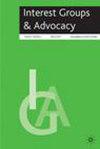From rhetoric to regulation: inferring lobbying influence on EU efforts to regulate $$\text {CO}_2$$ emissions of cars using network analysis
IF 1.5
Q2 POLITICAL SCIENCE
引用次数: 0
Abstract
Abstract This study shows how the automotive industry was able to influence the final legislation of the Community Strategy to reduce $${CO}_{2}$$从修辞到监管:利用网络分析推断游说对欧盟监管$$\text {CO}_2$$汽车排放努力的影响
本研究展示了汽车行业如何能够影响共同体战略的最终立法,以减少乘用车和轻型商用车的$${CO}_{2}$$二氧化碳排放,尽管欧盟委员会的介绍性评论得到了一个竞争利益集团联盟的支持:环保非政府组织。为了操作和分析游说对欧盟政策制定过程的影响,我使用了一种在利益集团研究中尚未广泛使用的方法:话语网络分析和指数随机图模型的推理网络分析。这种方法组合使我能够分析欧盟政策过程中不同阶段的政治辩论,以深入了解汽车游说者如何能够根据他们的利益塑造最终立法,以及哪些政治决策者授权他们这样做。令人惊讶的是,欧洲议会成员的党派关系只是一个从属的角色,而欧洲议会议员的出身是他们是否支持环保非政府组织或汽车工业的建议的重要预测因素。后者的建议在欧盟委员会的提案中被采纳,随后在最终法规中被采纳。由于该方法可以很容易地应用于不同政策领域的案例研究,因此它为分析欧盟游说提供了一个有希望的框架。此外,网络方法易于扩展,允许未来的研究整合欧盟游说研究的不同分支,而不仅仅是影响分析。
本文章由计算机程序翻译,如有差异,请以英文原文为准。
求助全文
约1分钟内获得全文
求助全文
来源期刊

Interest Groups & Advocacy
POLITICAL SCIENCE-
CiteScore
2.60
自引率
25.00%
发文量
26
期刊介绍:
Interest Groups & Advocacy will engage broadly with the politics of interests. It will record and analyze how advocacy by groups, movements and lobbying professionals shapes policy, and it will address important debates about how such interests are mobilized and maintained. It will cast a wide net across politics and society to identify the forces, strategies, and tactics that determine policy change. Open to diverse methodologies, it welcomes studies that address theoretical issues, report rigorous empirical work, and deliver insight on the range of change agents and their behaviour and impact.
Although this is a field traditionally dominated by American political science, in recent years there has been a widening geographical range as scholarly attention has reflected the growth of numbers, lobbyists have proliferated, and spending has increased in Europe, and in many states, provinces and localities around the world. Such territorial expansion of focus has been accompanied by broadened interest in the number and type of advocacy organizations, (far from the textbook stereotypes of interest groups), such as multi-national corporations, NGOs, and social movements, that seek to influence public policies.
With the active assistance of a diverse and experienced editorial board, the Editors explicitly seek to create a visible, well-regarded journal with the highest standards.
Whether in addressing historical issues or recent events, prospective articles should be sophisticated and of interest to a wide audience. We seek incisive, well-researched, and well-written articles. These qualities are especially important given our desire to attract contributions and attention from practitioners in the worlds of lobbying and group organization. Alongside the Editorial Board there is a Practice Panel to ensure our contents are credible in the world of practice.
Although this journal is anchored within political science, these aims will not be addressed satisfactorily without submissions from other disciplines, such as economics, sociology, law, and history. Social movement scholarship clearly falls under the broad field; likewise, public affairs makes up a major component of the process of competitive advocacy that is now commonplace as a proxy for democratic contestation.
The Editors and the editorial board welcome contributions in this broad area and intend to respond promptly to authors, with a goal of communicating decisions in no more than six weeks.
Although these matters have long received scholarly attention, they have never commanded the attention of a single journal and specialist reviewing. We look forward to establishing Interest Groups & Advocacy as this focal point.
 求助内容:
求助内容: 应助结果提醒方式:
应助结果提醒方式:


